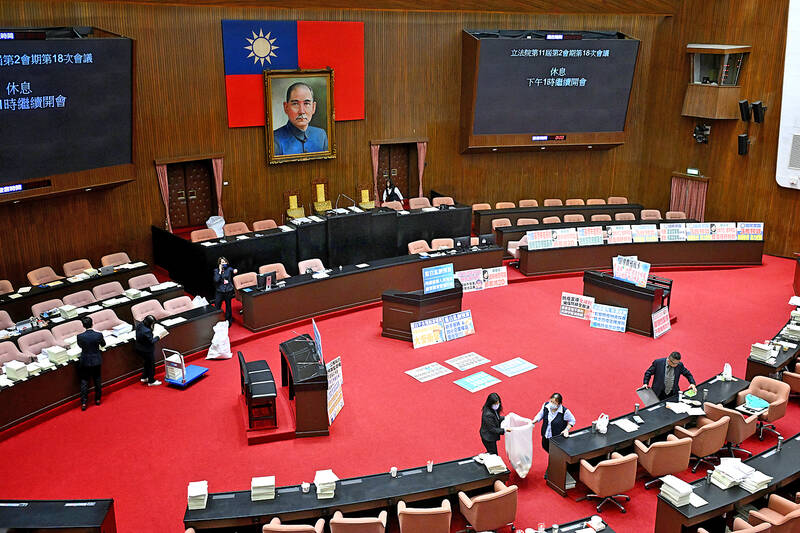The greatest threat to national security is the legislature, as lawmakers have the greatest access to confidential material with the fewest safeguards, Democratic Progressive Party (DPP) Legislator Wang Ting-yu (王定宇) said, calling for greater security protections through legislation.
DPP lawmakers including Wang are pushing for amendments to national security laws in the new legislative session.
“The Legislative Yuan itself is the biggest” weak point for national security, DPP Legislator Wang Ting-yu (王定宇) said in a recent interview about his concerns for the upcoming session.

Photo: Chen Yi-kuan, Taipei Times
Legislators have access to sensitive information, yet are subject to few restrictions, a major loophole that needs closing, he said.
Compared with European nations or the US, Taiwan lacks strict standards when it comes to lawmakers’ behavior, he added.
Regarding donations through social media platforms, Wang said that although laws prohibit legislators from accepting funds from the Chinese Communist Party (CCP), it is impossible to verify where money comes from if it is routed through an online service such as YouTube.
The legislature could require that all donations over a certain amount be reported, or the questions of who and where such funds are coming from would remain unknown, he said.
The Political Donations Act (政治獻金法) needs to be amended, as there are still too many ways for foreign funds to enter Taiwan, DPP Legislator Puma Shen (沈伯洋) said, but added that bipartisan consensus on the issue would be difficult to reach.
Wang also voiced concerns over people wearing Chinese People’s Liberation Army uniforms and pledging allegiance to China, saying that lawmakers should clarify penalties for doing so.
On the issue of legislators traveling to China, Shen’s proposed amendments to the Act Governing Relations Between the People of the Taiwan Area and the Mainland Area (臺灣地區與大陸地區人民關係條例) have been blocked by the Chinese Nationalist Party (KMT) and Taiwan People’s Party (TPP) 30 times, he said.
Nobody knows what lawmakers discuss when they go to China or meet with CCP officials in other locations, he said.
The KMT and TPP nominating Chinese immigrants to serve as lawmakers merits immediate legislative regulation, Shen said, adding that China’s “gray zone” warfare tactics might also require legislative changes to address.
Too many Taiwanese have close ties to China, and the scope of what is legally considered treason is too narrow, he said.
“What I now fear the most is [KMT caucus whip] Fu Kun-chi (傅?萁) bringing half of their lawmakers to China saying they want to sign a peace agreement. That would be the end of Taiwan,” Shen said.
He also cited maritime regulations as an area in which increasing criminal punishments might not be an effective solution, saying that the government could expand enforcement to allow the coast guard more authority to detain ships.
However, as long as the KMT and TPP maintain their majority, it would be difficult to pass such amendments, Wang said.

Taiwan is to have nine extended holidays next year, led by a nine-day Lunar New Year break, the Cabinet announced yesterday. The nine-day Lunar New Year holiday next year matches the length of this year’s holiday, which featured six extended holidays. The increase in extended holidays is due to the Act on the Implementation of Commemorative and Festival Holidays (紀念日及節日實施條例), which was passed early last month with support from the opposition Chinese Nationalist Party (KMT) and Taiwan People’s Party. Under the new act, the day before Lunar New Year’s Eve is also a national holiday, and Labor Day would no longer be limited

COMMITMENTS: The company had a relatively low renewable ratio at 56 percent and did not have any goal to achieve 100 percent renewable energy, the report said Pegatron Corp ranked the lowest among five major final assembly suppliers in progressing toward Apple Inc’s commitment to be 100 percent carbon neutral by 2030, a Greenpeace East Asia report said yesterday. While Apple has set the goal of using 100 percent renewable energy across its entire business, supply chain and product lifecycle by 2030, carbon emissions from electronics manufacturing are rising globally due to increased energy consumption, it said. Given that carbon emissions from its supply chain accounted for more than half of its total emissions last year, Greenpeace East Asia evaluated the green transition performance of Apple’s five largest final

Taiwan is to extend its visa-waiver program for Philippine passport holders for another year, starting on Aug. 1, Minister of Foreign Affairs Lin Chia-lung (林佳龍) said on Friday. Lin made the announcement during a reception in Taipei marking the 127th anniversary of Philippine independence and the 50th anniversary of the establishment of the Manila Economic and Cultural Office (MECO) in Taiwan, the Ministry of Foreign Affairs said. The decision reflected Taiwan’s commitment to deepening exchanges with the Philippines, the statement cited Lin as saying, adding that it was a key partner under the New Southbound Policy launched in 2016. Lin also expressed hope

Temperatures in New Taipei City’s Sindian District (新店) climbed past 37°C yesterday, as the Central Weather Administration (CWA) issued heat alerts for 16 municipalities, warning the public of intense heat expected across Taiwan. The hottest location in Taiwan was in Sindian, where the mercury reached 37.5°C at about 2pm, according to CWA data. Taipei’s Shilin District (士林) recorded a temperature of 37.4°C at noon, Taitung County’s Jinfeng Township (金峰) at 12:50 pm logged a temperature of 37.4°C and Miaoli County’s Toufen Township (頭份) reached 36.7°C at 11:40am, the CWA said. The weather agency yesterday issued a yellow level information notice for Taipei, New